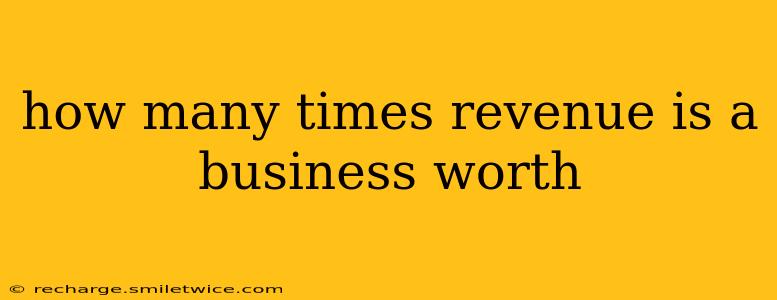How Many Times Revenue Is a Business Worth? A Deep Dive into Valuation Multiples
Determining a business's worth is a complex process, and simply multiplying revenue by a certain number rarely provides an accurate valuation. While revenue is a crucial factor, it's just one piece of the puzzle. The "how many times revenue" question doesn't have a single, universally applicable answer. The appropriate multiple depends heavily on several key factors, making it vital to understand the nuances before attempting to calculate a business's value.
What Factors Influence a Business's Valuation Multiple?
Several crucial elements impact how many times revenue a business is worth. These include:
-
Industry: Businesses in high-growth industries with strong profit margins (like technology) often command higher multiples than those in mature, low-margin industries (like retail). A software company might be valued at 5-10x revenue, whereas a grocery store might be valued at 0.5-2x revenue.
-
Profitability: Profitability is a cornerstone of valuation. Businesses with consistent and growing profits will attract higher multiples than those with low or inconsistent profits, even if their revenue is similar. Look at metrics like EBITDA (Earnings Before Interest, Taxes, Depreciation, and Amortization) and net income.
-
Growth Rate: A business demonstrating strong, sustainable revenue growth will generally be worth more than one with stagnant or declining growth. Investors are willing to pay a premium for businesses with significant growth potential.
-
Market Position: A dominant market leader with a strong brand and significant competitive advantages will command a higher valuation than a smaller, less established player in the same industry.
-
Risk: The inherent risks associated with a business significantly impact its valuation. Businesses operating in volatile markets or facing regulatory uncertainties will typically have lower multiples than those in stable, predictable industries.
-
Assets and Liabilities: The value of a company's tangible and intangible assets (like intellectual property) and the level of its liabilities (like debt) all factor into its overall worth.
-
Cash Flow: Positive and consistent cash flow is highly prized by investors. A business that generates strong cash flow will generally be valued more favorably than one with weak or negative cash flow.
What are common valuation multiples used?
While "times revenue" is a simplified approach, professional valuations often employ several multiples, including:
-
Price-to-Earnings Ratio (P/E): This compares a company's stock price to its earnings per share. It's frequently used for publicly traded companies.
-
Enterprise Value-to-EBITDA (EV/EBITDA): This compares a company's enterprise value (market capitalization plus debt minus cash) to its EBITDA. It's a common metric for comparing companies across different capital structures.
-
Price-to-Sales Ratio (P/S): This compares a company's market capitalization to its revenue. This is often used for companies that are not yet profitable or have inconsistent profitability.
How Do I Get a More Accurate Valuation?
Determining a realistic valuation requires a more sophisticated approach than simply multiplying revenue by a factor. Consider these options:
-
Discounted Cash Flow (DCF) Analysis: This method projects future cash flows and discounts them back to their present value, providing a more robust valuation.
-
Comparable Company Analysis (CCA): This involves comparing the target company to similar businesses that have recently been acquired or are publicly traded.
-
Precedent Transaction Analysis: This method examines previous transactions involving similar companies to establish a valuation range.
-
Hire a Valuation Professional: Engaging a qualified business valuation expert is often the best approach for complex businesses or significant transactions. They can provide a comprehensive valuation incorporating all relevant factors.
In conclusion, there's no magic number to multiply revenue by to determine a business's worth. A thorough valuation requires a deep understanding of the business, its industry, financial performance, and market conditions. Using multiple valuation methods and seeking professional advice is highly recommended for accurate results.
